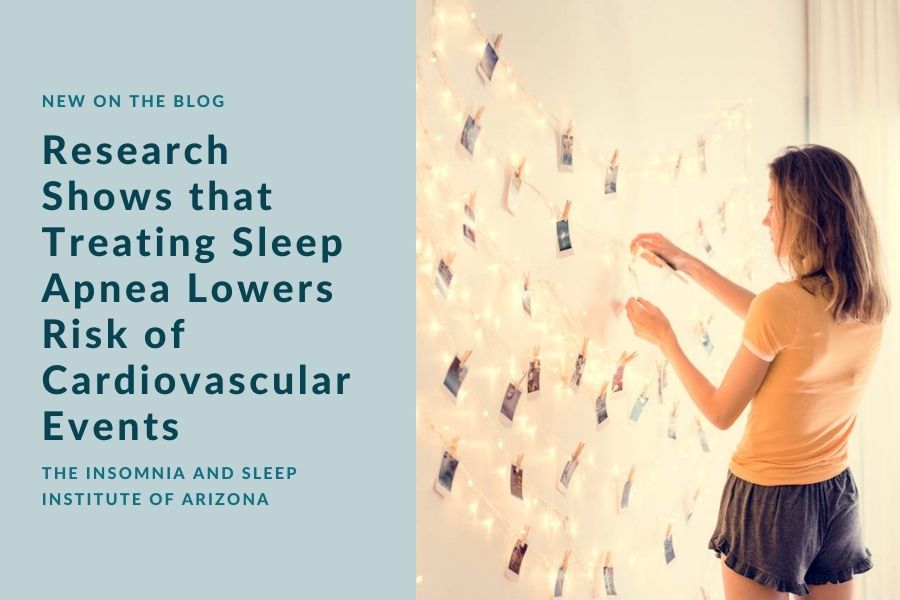It is estimated that one in 15 adults in the U.S. has obstructive sleep apnea (OSA), the most common type of sleep apnea. Treatment is available, and The Insomnia and Sleep Institute of Arizona offers an outcome-driven solution with an initial consultation exclusively with a sleep specialist. This is the best avenue to planning for the next steps, including testing and treatment. CPAP therapy remains the gold standard when it comes to treating OSA, but those who do not find success with CPAP may be good candidates for the Inspire implant, which is also available at The Insomnia and Sleep Institute.
According to recent research, those with moderate to severe OSA who go untreated have a higher risk of a cardiovascular event—however, those who use CPAP properly enjoy a sizeable decrease in this heart-related risk. In fact, those who never tried CPAP are 71 percent likelier to suffer from a myocardial infarction, heart failure, stroke, unstable angina, and cardiovascular death. The researchers say that the study “contributes to understanding the role of CPAP therapy for cardiovascular risk prevention” and that “the effects of CPAP were stronger in patients with moderate to severe sleep apnea, as well as in patients who used CPAP, on average, greater than 4 hours per night.”
The Study Linking CPAP and Heart-Related Events
The researchers considered health records of patients from 2018 – 2020 at Kaiser Permanente in California, which included over 11,000 people without OSA, nearly 14,000 people with sleep apnea who had used CPAP to some degree, and over 20,000 people with sleep apnea who had never used CPAP therapy. One requirement of the study was that patients had to have no report of cardiovascular disease for at least one year before their diagnosis of sleep apnea.
The study was observational in nature but does suggest that CPAP therapy (again, adhered to correctly) for OSA patients is “necessary” and “could be critical for optimizing comorbidity risk reduction” including heart-related events according to the researchers.
OSA and Co-morbidities
Heart-related events are just one group of co-morbidities that studies have linked to having an increased risk in untreated OSA. The list of related health effects is long and varied, ranging from diabetes to mood disorders. Treatment for OSA is typically CPAP therapy, but patients must be diagnosed correctly first and then treated in a manner in which they are encouraged to follow therapy protocol. Many patients stop using CPAP therapy right away when they find it uncomfortable, but many times the answer lies in working with a sleep specialist to ensure a proper fit.
The Insomnia and Sleep Institute has been voted “Top Doc” in the area for six consecutive years. We are staffed by sleep specialists who concentrate in sleep medicine and are also home to a clinical psychologist who focuses on cognitive behavior therapy (CBT) for insomnia, nurse practitioners with extensive sleep training medicine, respiratory therapists, and a physician assistant with a Masters in Sleep. We are proud to serve you as the Face of Sleep Medicine in the Phoenix area and are committed to setting the standard for sleep medicine in Arizona.
Treat Your OSA Today
Since consultations are only with sleep specialists, you can start the journey towards a correct diagnosis for OSA or any other sleep disorder today. Lowering your risk of cardiovascular events is just one big benefit to managing OSA. You can enjoy overall better health and a higher quality of life when your sleep is uninterrupted. OSA is a very common condition, and many people are unaware that they have it—in fact, unless a bedmate lets you know about signs of OSA, many people go years without pursuing a diagnosis.
You do not need a referral from a GP or any medical professional to schedule your consultation at The Insomnia and Sleep Institute. If you suspect you have OSA (or that your child has OSA), get in touch today. OSA can be chronic, but it is also manageable. In addition to CPAP therapy, there are other approaches that may be effective, including lifestyle changes and improvements to sleep hygiene. Contact The Insomnia and Sleep Institute today by calling the office or simply complete the online form.





